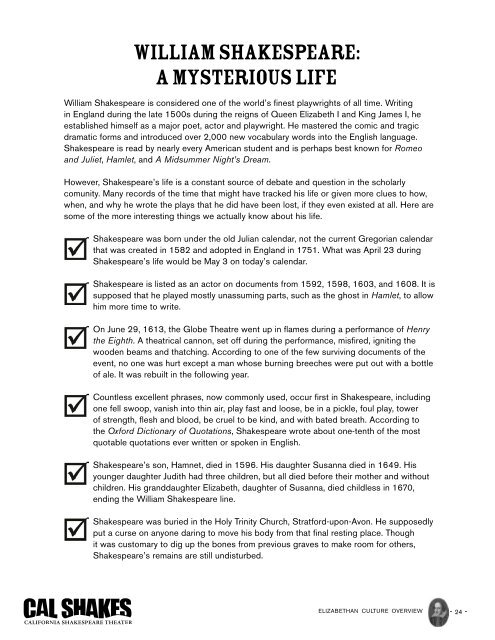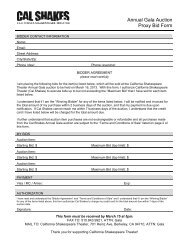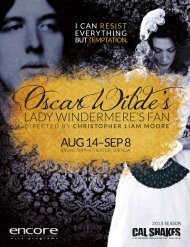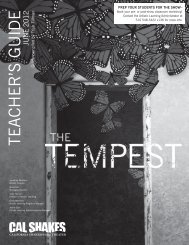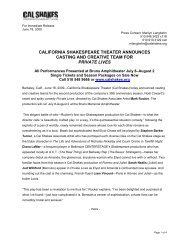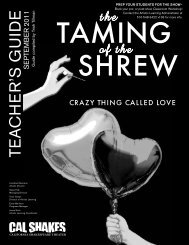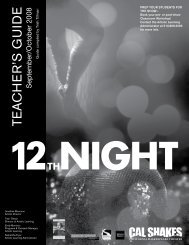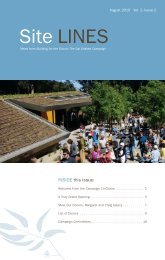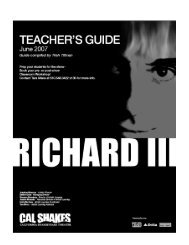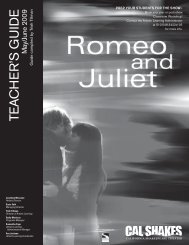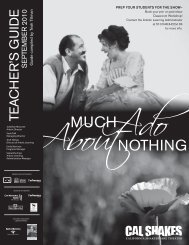A Midsummer Night's Dream - California Shakespeare Theater
A Midsummer Night's Dream - California Shakespeare Theater
A Midsummer Night's Dream - California Shakespeare Theater
Create successful ePaper yourself
Turn your PDF publications into a flip-book with our unique Google optimized e-Paper software.
WILLIAM SHAKESPEARE:<br />
A MYSTERIOUS LIFE<br />
William <strong>Shakespeare</strong> is considered one of the world’s finest playwrights of all time. Writing<br />
in England during the late 1500s during the reigns of Queen Elizabeth I and King James I, he<br />
established himself as a major poet, actor and playwright. He mastered the comic and tragic<br />
dramatic forms and introduced over 2,000 new vocabulary words into the English language.<br />
<strong>Shakespeare</strong> is read by nearly every American student and is perhaps best known for romeo<br />
and Juliet, hamlet, and A <strong>Midsummer</strong> Night’s <strong>Dream</strong>.<br />
However, <strong>Shakespeare</strong>’s life is a constant source of debate and question in the scholarly<br />
comunity. Many records of the time that might have tracked his life or given more clues to how,<br />
when, and why he wrote the plays that he did have been lost, if they even existed at all. Here are<br />
some of the more interesting things we actually know about his life.<br />
<strong>Shakespeare</strong> was born under the old Julian calendar, not the current Gregorian calendar<br />
that was created in 1582 and adopted in England in 1751. What was April 23 during<br />
<strong>Shakespeare</strong>’s life would be May 3 on today’s calendar.<br />
<strong>Shakespeare</strong> is listed as an actor on documents from 1592, 1598, 1603, and 1608. It is<br />
supposed that he played mostly unassuming parts, such as the ghost in hamlet, to allow<br />
him more time to write.<br />
On June 29, 1613, the Globe Theatre went up in flames during a performance of henry<br />
the eighth. A theatrical cannon, set off during the performance, misfired, igniting the<br />
wooden beams and thatching. According to one of the few surviving documents of the<br />
event, no one was hurt except a man whose burning breeches were put out with a bottle<br />
of ale. It was rebuilt in the following year.<br />
Countless excellent phrases, now commonly used, occur first in <strong>Shakespeare</strong>, including<br />
one fell swoop, vanish into thin air, play fast and loose, be in a pickle, foul play, tower<br />
of strength, flesh and blood, be cruel to be kind, and with bated breath. According to<br />
the Oxford Dictionary of Quotations, <strong>Shakespeare</strong> wrote about one-tenth of the most<br />
quotable quotations ever written or spoken in English.<br />
<strong>Shakespeare</strong>’s son, Hamnet, died in 1596. His daughter Susanna died in 1649. His<br />
younger daughter Judith had three children, but all died before their mother and without<br />
children. His granddaughter Elizabeth, daughter of Susanna, died childless in 1670,<br />
ending the William <strong>Shakespeare</strong> line.<br />
<strong>Shakespeare</strong> was buried in the Holy Trinity Church, Stratford-upon-Avon. He supposedly<br />
put a curse on anyone daring to move his body from that final resting place. Though<br />
it was customary to dig up the bones from previous graves to make room for others,<br />
<strong>Shakespeare</strong>’s remains are still undisturbed.<br />
ELIZABETHAN CULTURE OVERVIEW<br />
- 24 -


